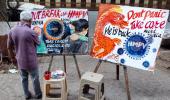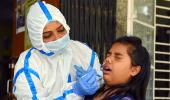'We have to be wary because if an uncontrolled transmission happens, random mutations may lead to something which could be virulent and then that could land us in a problem.'

COVID-19 has returned.
The number of cases resulting from the JN. 1 strain, progeny of Omicron (B.1.1.529), is quite quickly mounting and has nearly crossed 260 countrywide as of May 20.
The majority of them have been reported in Maharashtra, Kerala and some in Tamil Nadu.
Are we looking at a new wave?
Vaihayasi Pande Daniel/Rediff spoke to Dr Anup R Warrier for his insights and advice on how to face this new surge.
A Hyderabad, Mumbai and Detroit-trained consultant for infectious diseases at the Aster Medcity Hospital, Kochi, he has fought the worst of the COVID-19 wars, right from early 2020.
"We should not be giving much opportunities for the virus to multiply by blocking or (handicapping) its transmission, so that its ability to mutate also reduces, because we are reducing its ability to multiply," says Dr Anup.
There have been several smaller outbreaks of COVID-19 since the worst bouts during the epidemic. Cases are rising right now in Maharashtra, Kerala. What does the situation look like to you?
We have to look at it from a couple of different perspectives.
From the short-term perspective, we look at whether it is putting a pressure on the healthcare systems. And do we have an increase in admissions, severity, mortalities or deaths due to this.
Even though the number of cases has gone up, we do not see too many severe cases or too many admissions due to pneumonia, etc.
From the short-term perspective, definitely until now it has not made a big impact. Even though there are a number of cases, we don't see much problem (with regard to an overloaded) healthcare system, ICUs, medical institutions, etc.
From the medium-term perspective, because this is a somewhat a newer sort of strain - JN. 1 -- how much of the immunity from the earlier (rounds of the) disease and vaccines, etc will prevent this strain from mutating into something that could be virulent.
That is something which we have to closely watch for.
We know that whenever cases rise and the virus gets more opportunity to multiply, there is an increased chance of mutations. And then there can be a random chance that these mutations give rise to something that could be serious, like the Delta variant, which we had at that time.
Maybe over the next months we will be able to understand how that turns out.
The comforting thing has been that when we had a couple of similar episodes, even last year, when the number of minor cases went up, then also we did not see too many sick or severe cases being admitted or landing up in the ICU. So that's a little bit of a comfort.
But, as I was saying, this is a random thing. A random mutation can become something which is more virulent or can cause severe disease. Then that would be a problem.
Ideally, we should not be giving much opportunities for the virus to multiply by blocking or (handicapping) its transmission, so that its ability to mutate also reduces, because we are reducing its ability to multiply.

Have you personally seen any severe cases?
We have seen very few. One or two cases, predominantly among cancer patients.
The long-term perspective is that we know that even the earlier COVID-19 outbreaks and, to some extent, maybe the vaccine or whatever, has tweaked our immune system. Following that, we have seen more autoimmune diseases.
We have seen certain unusual presentations, like prolonged fever without any specific cause.
So, there were some autoimmune problems, which had come up during the early days of COVID-19 and this was seen even in people who had suffered mild COVID. This increase in autoimmune issues is not related to the severity of the disease.
Even though we may brush it off, saying that this is not too severe at the moment, even minor episodes have a probability of increasing the incidence of problems related to autoimmune diseases.
Either known autoimmune diseases like rheumatoid arthritis or similar or unusual presentations because of this abnormal immune reaction.
For example, we are seeing increased cases of what we call as macrophage activation syndrome (dangerous cytokine storm) following hepatitis A.
Before COVID-19 we used to have a lot cases of hepatitis A. But after COVID-19, the clinical picture or the way hepatitis A is behaving or the complications of hepatitis A have changed.
That is because our immune system has been tweaked a bit.
To summarise: In the short term we are safe because we are not seeing or identifying any increased admissions or too much ICU occupancy. That's not there.
In the medium term, we have to be wary because if an uncontrolled transmission happens, random mutations may lead to something which could be virulent and then that could land us in a problem.
In the long term we have to be wary because already, from earlier rounds of COVID-19 infections, we are seeing a difference in how certain common diseases behave and also a surge of autoimmune conditions. (A fresh round) can once again have an impact on these other diseases too.
After the earlier much more serious waves, there have been, from time to time, surges in milder versions of COVID-19. This time one is reading about many cases in China, Singapore, Hong Kong, Thailand.
From your perspective, does this look like a little bit of a bigger surge?
It does, if you see the number of cases in the hospital. And what we notice is that when in a community the number of cases go up to a certain level, it reflects in the healthcare workers, who also contract this disease.
When we see more healthcare workers being affected, developing symptoms and testing positive, we know that it's a bit more compared to what we saw before.
But as I told you, all of these cases have been mild and only one or two cancer patients we had to admit because of pneumonia. But other than that, none of the cases we have seen were bad cases of the disease, which required hospitalisation or anything like that.
One thing which I missed out earlier to mention was that from the World Health Organisation's side 2021 or 2022 was their last update for COVID-19 vaccination. They had suggested that vulnerable people receive an additional dose beyond what was the standard three doses.
Something to debate about -- but it has to go through a lot of thought process -- is whether an additional dose of vaccination is to be considered or not.

Do you suggest that people living in Kerala or in Maharashtra should wear masks again?
I do, I do. When the number of cases among healthcare workers increased, we reintroduced universal masking in our hospital. It is necessary.
As I told you, the less opportunity we give for this variant to get transmitted and multiply, the better it is, and to, long term, reduce the risk of mutations.
Every time there are fresh COVID-19 outbreaks, why are Kerala and Maharashtra affected?
Most likely the reason is probably because of healthcare-seeking behaviour. In Kerala, for a fact, I know that the healthcare-seeking behaviour is much more.
Healthcare-seeking behaviour?
Yes, the tendency of a person to visit the hospital, to get himself checked, whenever he has symptoms.
It differs state to state and is based on medical infrastructure and also whether the people are keen on going down to clinics or hospitals and getting checked.
This healthcare-seeking behaviour is very high in Kerala. More than the average Indian, the Keralite goes to the hospital more often, for even minor ailments.
That also shows a certain sense of being aware?
Yes, correct. It is a reflection of awareness. The awareness and also the infrastructure. If you are aware, you should have the infrastructure and healthcare systems available, which can cater to you.
So, you do not suggest any cause for alarm, but just caution?
That is right. No cause for alarm. But definitely cause for some caution, because limiting the transmission has got long-term benefits also. It's not just for the time being.
And people suffering COPD or other underlying health conditions must be careful?
Those people should immediately take precautions.
Feature Presentation: Ashish Narsale/Rediff










